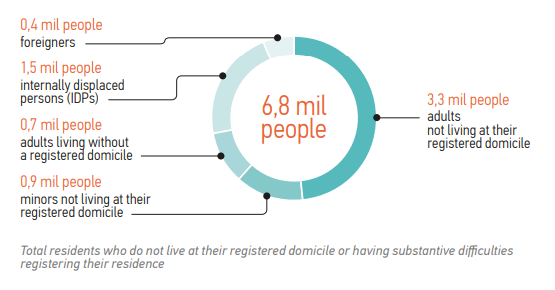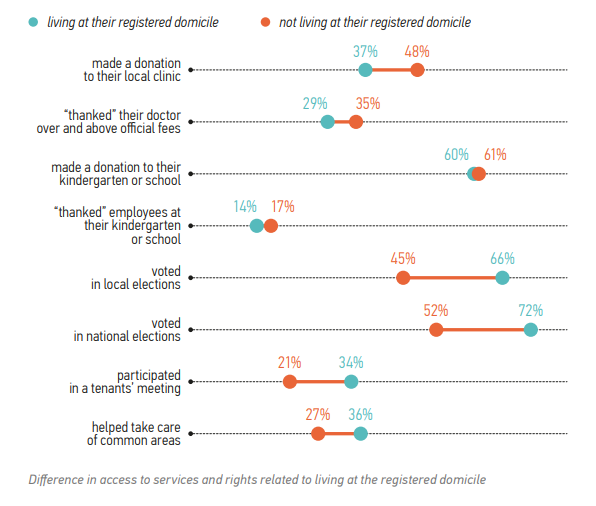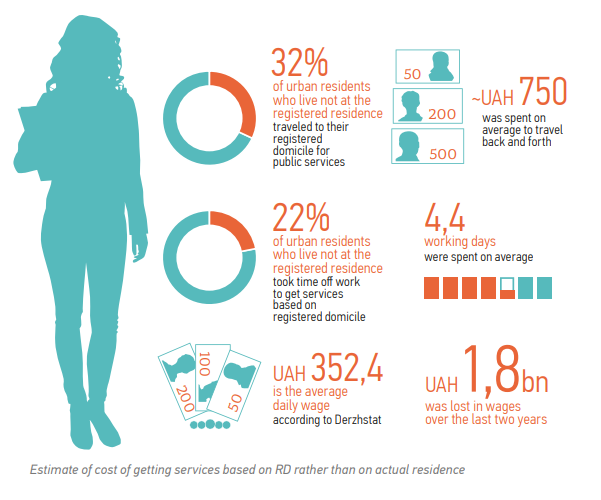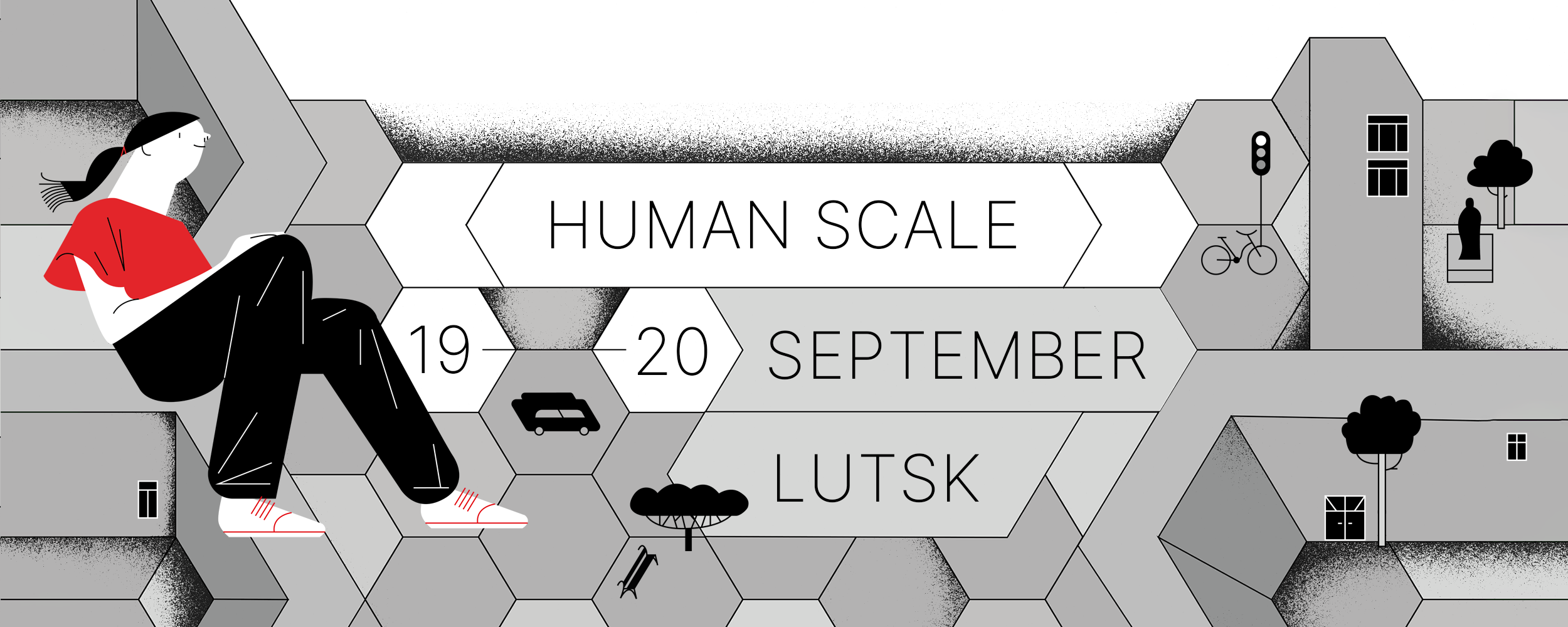Authors: Oleksandra Slobodian, Anastasia Fitisova
Project coordinator: Liudmyla Yankina
Translation: Lidia Wolanskyj
Design, layout and infographics: Ihor Konovalov
This material is an abbreviated version of “THE DOMICILE REGISTRATION SYSTEM IN UKRAINE: Its impact on the enjoyment of the rights and vital interests of the individual. Results of a sociological study.”
This study was undertaken as part of the “Freedom of movement for everybody: reform of the residence registration system in Ukraine” which is being carried out by the ZMINA Human Rights Center with funding from the European Union.
The opinions expressed here are the authors and do not necessarily reflect the position of the CEDOS think tank, Ukrainian Center for Independent Political Research, ZMINA Human Rights Center and the European Union.
Fair use of the materials in this report is acceptable, on condition that the source is identified.
Research methodology
This executive summary briefly presents the results of the first all-Ukrainian study on:
• how many people in Ukraine do not live at their registered domicile;
• a quantitative comparison of problems with access to services and the exercise of rights between those who live at their registered domicile and those who don’t;
• a quantitative assessment of the reasons why people don’t live at their registered domiciles.
Given these goal, two separate surveys were carried out: a nationwide general survey and a survey of urban residents who are not living at their registered domiciles. These polls were run consecutively over August-September 2018 by Kantar TNS in Ukraine.
Nationwide survey
The nationwide survey involved 5,400 respondents across Ukraine age 18 through 75, except for those living in occupied territories, IDPs, foreigners, stateless persons, and Ukrainian citizens who do not have a registered domicile. Data was collected August 2-22, 2018 using a stratified random sampling, with quotas for gender and age in the final step. The survey involved a personal interview at the residence of each respondent. The approximate margin of error, calculated for a random sampling of this kind, is 1.3%, not including design effect. The response rate was 32%.
Survey of urban residents who don’t live at their registered domicile
The survey of urban residents aged 18-75 that are not living at their registered domicile on the free territory of Ukraine was carried out September 7-16, 2018, and did not include IDPs, Ukrainian citizens without a registered domicile, foreigners, and stateless persons. The sample set was organized to represent all the urban population that is not living at its registered domicile and to represent different types of urban areas: the capital, major cities — Dnipro, Lviv, Odesa and Kharkiv — other oblast centers, other cities that are not oblast centers, and cities that are part of the capital region around Kyiv. For each type of city, five samplings were established, each of which included 400 respondents. Altogether, 2,000 respondents were surveyed. The survey involved individual interviews following a route based on street addresses. On average, every ninth person agreed to participate in the survey.
How many Ukrainian citizens do not live at their registered domicile?
Based on the national survey, the share of people not living at their registered domiciles is 12%, which means at least 3.3 million adult Ukrainians (This does not include internally displaced persons, foreigners, stateless persons, and those who have no registered domicile). Because of the methodological limitations of the survey due to the low response rate among individuals who are not living at their registered domicile and estimates using indirect methods, this number, 3.3 million of adult citizens of Ukraine, should be considered a minimum estimate. Given the categories of the population that were not included in the survey, the total number of individuals not living at their registered domicile or having substantive difficulties registering their domicile is probably at least 6.8 million.

What kinds of problems are faced by those who don’t live at their registered domicile?
Registering a domicile can create problems and restrict the exercise of rights for individuals who don’t live at that registered domicile. However, people don’t tend to connect these problems or restrictions on their rights with not living at their registered domicile.
Those polled appeared to be able to get primary medical care at state and community health facilities fairly often, regardless of whether they were living at their registered domiciles or not. Still, the chances of having to make unofficial payments for services at state-owned clinics was about 11pp higher for those who do not live at their registered domicile. Nearly two thirds of parents not living at their registered domicile also ended up paying extra to enroll their children in pre-schools and public schools. Otherwise, differences in behavior between those who do and do not live at their registered domiciles were insignificant.
Respondents who do not live at their registered domiciles were less likely to participate in elections and were less active in the cities or villages where they live. People who lived at their registered domicile were 21pp more likely to vote in the last local elections and 20pp more likely to vote in the last national elections. The likelihood that a person participated in tenant or neighborhood meetings where they lived was 13pp higher for those who live at their registered domicile, while the chances that a person participated in improving common areas in and around their building was 9pp higher.
Despite evident problems, not many people think that living at a registered domicile limits their rights. Only about 21% of those surveyed who don’t live at their registered domicile said that their rights were restricted because of this.
The reasons for this could be several:
• the need to get services or exercise rights that are tied to a registered domicile arises sporadically;
• gaining access to popular services, such as healthcare or education while not living at a registered domicile is often possible through a variety of widespread alternatives, many of them unofficial, that are easier to use than to register the current domicile;
• some services or rights to which access is restricted based on registered domicile are not perceived as particularly important;
• nearly half of those who don’t live at their registered domiciles live in, and are nevertheless registered in, the same population center, so they run into fewer obstacles and restrictions in access to services and the exercise of rights.
The fact that people who are not living at their registered domiciles are able to find alternative ways to access services and exercise their rights, are unable to get access to guaranteed services or cannot exercise their rights suggest that there are social losses through the restrictions that the domicile registration system imposes.

Why are people not registering their domicile?
For 85% of citizens, the main reason why they do not live at their registered domicile is because they have moved. Every 10th or so, 11%, deliberately changed their registered domicile without moving anywhere.
There is a whole range of reasons why people don’t live at their registered domicile:
Firstly, the vast majority doesn’t feel any need to register their current domicile (77%). Obviously, the option of getting public services and exercising their rights based on registering their current domicile doesn’t provide sufficient motivation for them to do so.
Secondly, the procedure for registering a person’s domicile is often the main obstacle to doing so, especially as it is very difficult for those who are don’t own the residence they are living in. Among those who live a residence they own, only 3% don’t live in their registered domicile. However, among those whose residence is owned by someone else, 25% don’t live in their registered domicile. Those who live in a residence owned by close relatives are much more likely to live in their registered domicile than those who live in a residence owned by strangers, 86% to 38%, meaning property owned by more distant relatives or those who rent out their property.
Thirdly, there is a general perception that being registered in a residence is connected to ownership rights. Even though registering a domicile in no way offers a way to gain rights to the property, memories of the soviet propiska system and the history of how housing was privatized in Ukraine lingers on in the imaginations of Ukrainians to this day even though registering a domicile is based on a different principle. Owners are reluctant to have people they don’t really know who are living in their residence register domicile at the property, especially renters. Fully 95% of respondents said that they would not register renters if they were to rent out their apartment. What’s more, owners are often unwilling to unregister themselves from a domicile they own in order to register the place where they actually reside.
Fourthly, some people might not bother registering their actual place of residence because of some benefit they gain in not living at their registered domicile. For instance, 8% of those who don’t live at their registered domicile said that they or family members had changed registered domiciles in order to qualify for subsidies. Every third man — 32% of those who don’t live at their registered domicile — said that he didn’t want to register his domicile because he didn’t want to be called up by the army. Every second urban resident, 49% of those who don’t live at their registered domicile, said that they didn’t want to register their current domicile because that could make residential services costs go up.

How do Ukrainians feel about having to register their domicile?
There is no general opinion among Ukrainians regarding the system of registered domiciles. Neither those who live at their registered domiciles, nor those who don’t are inclined see the current system as some kind of problem.
The majority, 60%, of those surveyed say that registering their domicile doesn’t, in fact, have any impact on their lives. At the same time, about every fourth person, 27%, sees some positive benefits while one in 10 says that it has a negative impact on their lives.
However, every second person, 49%, says the current system needs to be reformed: 26% think parts of the system need to be improved, 13% think it should be radically overhauled, while 10% think it should just be dropped altogether. Of urban residents not living at their registered domicile,
37% support the idea of reforming the system by not requiring people to prove that they have the right to register in a particular domicile. But only one in four, 25%, is prepared to actually register their domicile in order for such a system to be instituted.
In short, people often feel no need to register their domicile. They also have reasons not to de-register from a residence that belongs to them. Given this, any changes to the registration system intended to reduce the number of individuals not living at their registered domicile needs to be preceded by an appropriate public awareness campaign and include incentives. Otherwise, simplifying the procedure will not necessarily lead to more people registering their domiciles.
Support Cedos
During the war in Ukraine, we collect and analyse data on its impact on Ukrainian society, especially housing, education, social protection, and migration












